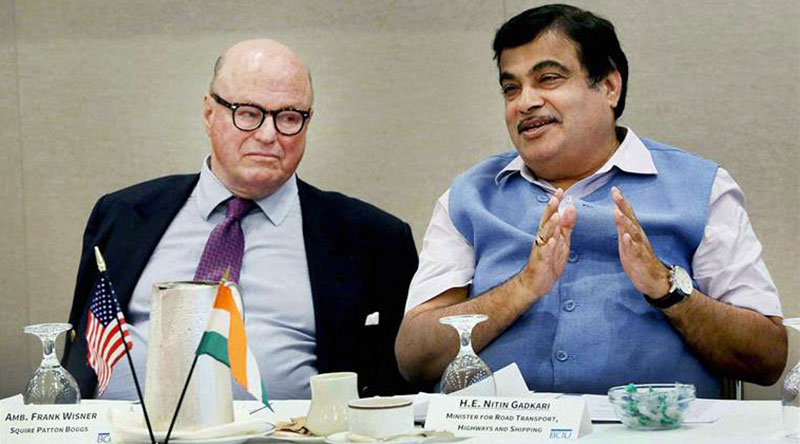[vc_row][vc_column][vc_column_text]
India and the United States have agreed to deepen the scope of cooperation in the maritime sector with American ports evincing keen interest in the comprehensive port-led development, especially with regard to the ambitious Sagarmala programme under which 150 projects have the potential of mobilising USD 50-60 billion of infrastructure investment and another $100 billion of promoting industrial growth.
Union Minister of Shipping, Road Transport and Highways Nitin Gadkari, who held wide-ranging discussions with the representatives of Harbour Department of the City of Long Beach, offered investment opportunities in building and developing new ports, construction of new berths/terminals in existing ports, coastal economic zones, dredging, ship building, ship repairing, ship recycling, development of inland waterways and coastal and cruise shipping.
Gadkari went round the Port of Long Beach and explored joint venture opportunities with India’s flagship container handling Jawaharlal Nehru Port (JNPT) to promote transfer of technology and enhance bilateral commerce.
The Shipping Minister outlined the regulatory assistance which the Narendra Modi government has offered to the maritime sector, including grant of infrastructure status to shipyards, supportive domestic eligibility criteria for Indian shipyards for assured ship repair orders, service tax exemption on ship repair service for foreign going vessels, setting up of ship repairing business immediately without any approval from Director Generals.
Besides, Gadkari said the government has agreed to provide maritime clusters for ancillary industrial support and design centres, as well as financial assistance to meet the challenge of lack of competitive advantage due to heavy subsidies provided by major shipbuilding countries to their shipbuilding industry.
Gadkari also highlighted the vision of Sagarmala envisaging reduction of logistics cost for EXIM and domestic trade with minimal infrastructure investment aimed at creating four million new direct jobs and another six million indirect jobs.
He told the US maritime sector that thematic studies and action plans have been developed across sector for implementation, prominent elements of which include coastal shipping revolution, coastal industrial Greenfield plants, reduced time to export container by five days and reducing cost to export by $50 per container.
Gadkari was briefed about the rising imports fuelled higher container traffic at the Port of Long Beach. More than 2,000 vessels call at the Port of Long Beach each year, moving $180 billion in cargo – that’s almost half a billion dollars worth of international commerce every day.
Gadkari was told that through a new incentive, the Port is increasing the benefits for tenants who replace their old, inefficient electrical equipment with new technology – and boost the overall sustainability, resilience and competitiveness of the Port in the process.
He was informed that under the Energy Island Initiative, with a view to accelerating energy efficiency, a comprehensive programme for transitioning to renewable power sources and self-generation systems has been introduced by focusing on clean energy generation, conservation and power projects.
[/vc_column_text][/vc_column][/vc_row]








